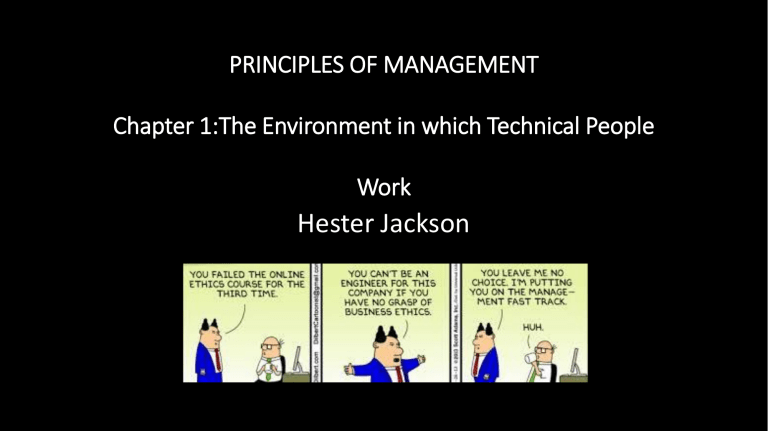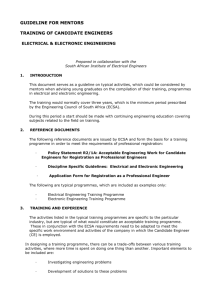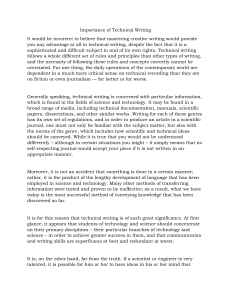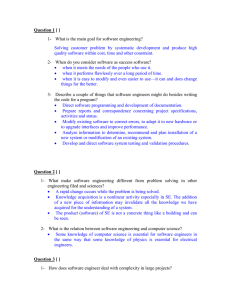
PRINCIPLES OF MANAGEMENT Chapter 1:The Environment in which Technical People Work Hester Jackson The Environment in which Technical People Work Learning Outcomes • Define what an engineer, technologist, and scientist is; • Explain the role of engineers in society • Engineering skills and knowledge • Engineers as (project) managers, executives and supervisors • The organizational and other life cycle • Characteristics of the environment in which as engineer work The Engineer, Technologist & Scientist defined Engineer : a person who designs, builds, or maintains engines, machines, or structures. According to The Engineering Council of the South Africa); Engineering is the practice of science, engineering science and technology concerned with the solution of problems of economic importance and those essential to the progress of society. The Engineer, Technologist & Scientist defined Technologist : somebody who uses or applies technology. Technology is needs driven, whereas curiosity and speculation about the natural world usually drives science. The aim of technology is: • To create and improve artefacts and systems that will satisfy human needs or aspirations. • Success is judged in terms of, for example, performance, efficiency, reliability, durability, cost of production, ecological impact, safety-and end-of-life disposability The Engineer, Technologist & Scientist defined Scientist: Scientists generally aim to produce theories that can be tested experimentally in the public domain and valued according to criteria such as simplified elegance, comprehensiveness and range of explanatory power. The role of Engineers in Society Many roles can be assigned to engineers. They may include • Guardians of new innovations, • Creators of technological change, • Driving force behind prosperity of a nation, • Raise living standards and bring benefits to society as a whole. Engineers are entrusted with difficult and dangerous projects; they are called on to make ethical decisions; they provide needs, fulfils aspirations, generate the driving force behind prosperity, builders of dreams and fantasies of a nation. Skills and Knowledge • Engineers need some non-technical skills and knowledge to be successful in the business environment and. • The wide range of skill used by engineers is one of the reasons why engineering is such an exciting and challenging profession. • Engineers often have to combine technical skills with various nontechnical skills and knowledge. • Technical skill-and creative talent are not enough for an engineering practitioner to survive in today's business environment. Skills and Knowledge • Engineers need some non-technical skills and knowledge to be successful in the business environment and. • The wide range of skill used by engineers is one of the reasons why engineering is such an exciting and challenging profession. • Engineers often have to combine technical skills with various nontechnical skills and knowledge. • Technical skill-and creative talent are not enough for an engineering practitioner to survive in today's business environment. Communication Systems Thinking Problem defining Project Management Skills and Knowledge Professionalism Quality Control Law and Contracts Problem Solving Human issues Ethical behaviour Innovation Entrepreneurial Marketing Technical Skills Team work Engineers as Executives, Project Managers, and Supervisors • Engineers not only generating ideas and design objects, They also manage projects, administer budgets and direct others to implement their ideas. • It is especially for the execution aspect of their ideas that engineers need management knowledge and skills. • Many engineers spend much or their working lives managing rather than directly practicing their engineering specialization. • Within 10 years of starting their careers, many engineers • take on leadership and management roles. Challenges of Engineering Managers • Engineering managers have responsibilities in many different areas. To manage a team, they must have a clear, deadline-driven vision for every project. • Learning how to make strategic short- and long-term plans, manage time, deal with stress and set goals can help new managers succeed. • Developing a schedule for regular check-ins with team members is important for effective team performance. Challenges of Engineering Managers • An essential skill that can be tricky for new managers to master is how best to motivate their teams. • Managers who take the time to learn what motivates each team member — and provide that motivation to the best extent possible — can increase collaboration and overall productivity. While transitioning to a new career is always a challenge, assuming a new role in engineering management can be easier with proper preparation. Organizational life cycle • All successful organizations are started al some point and tend to become larger and more complex over time. • A number of researchers have proposed that the changes that take place during the life of an organization follow a certain pattern, called the organizational life cycle. • lt is important to note that the same methods and knowledge (project management body of knowledge) that is used to manage the initial project for establishing a facility such as a plant or factory can also be applied to manage some of the activities that take place during the operational stages of such facilities. Organizational life cycle Characteristics of Environment in which Engineers work. • Social Environment Management is a social science. One definition of management is 'to get things done through people’. The success of a business depends largely on bow well management can get employees to work together. Social responsibility of Engineering profession is commitment to place public safety and interest ahead of all considerations. It means that engineer takes into account and show due regard for the consequences of their conduct for wellbeing of others as well as the impact of their work on society. Characteristics of Environment in which Engineers work. Social Environment • An ethical business environment will ensure that workers are not exploited and that engineers can be trusted by society. Technology is neutral but can be used in constructive or destructive ways by people-. • Technologies such as nuclear fission can for example be used constructively to generate electricity (assuming that the nuclear waste can be stored safely) or destructively to develop nuclear weapons that can be used to destroy life and habitats. • Society expects engineers to have the right values. Nobody wants to be killed or injured in a collapsing shopping mall, soccer stadium or on a badly designed road. Characteristics of Environment in which Engineers work. Economic and international Environment Organizations impact negatively on the physical environment when they release high concentrations of harmful chemicals into water bodies, the air and soil. Such acts of pollution can impact negatively on people living in the vicinity. Management Practices deals with environmental legislation; management of the design of products and processes to minimise its impact on the environment; and how an organization could contribute towards sustainable development. Characteristics of Environment in which Engineers work. The institutional political environment Economics rule our lives to a large extent. People, companies and even governments are restricted by limited resources and have to do the best with the resources they have. The political environment can pose a risk to companies in the form of higher taxes, tougher legislation, changing legislation and even the nationalization of companies. Characteristics of Environment in which Engineers work. The technological environment The technological environment is influenced by the level of scientific and technological development in society. The changing technological environment, and the way an organization adapts or pre-empts these changes, could have a significant impact on the success of an organization. Engineering Council of South Africa • The Engineering Council of South Africa (ECSA) is a statutory body established in terms of the Engineering Profession Act (EPA), 46 of 2000. • The ECSA's primary role is the regulation of the engineering profession in terms of this Act. Its core functions are the accreditation of engineering programmes, registration of persons as professionals in specified categories, and the regulation of the practice of registered persons. • Consequently, the ECSA is the only body in South Africa that is authorized to register engineering professionals and bestow the use of engineering titles, such as Pr Eng, Pr Tech Eng, Pr Techni Eng, Pr Cert Eng, on persons who have met the requisite professional registration criteria. Why register with ECSA • Peer Recognition - By registering you receive recognition from the ECSA’s committees that you meet the minimum requirements expected of a professional person. This recognition extends to colleagues, as well as all other practitioners in the profession. • Public Confidence - The professional recognition you receive by becoming a member of the ECSA instils a sense of confidence in the mind of the public, since they can be assured that your competence has been assessed by other professionals (knowledgeable in your field of expertise). • Membership of Certain Voluntary Associations- Many institutions, for example the SA Institute of Industrial Engineering (SAIIE), requires that you be registered as a Professional Engineer before you can be granted corporate membership. Why register with ECSA • International Recognition - The ECSA is a co-signatory to the "Washington Accord" – an agreement in which the registering bodies of countries such as Australia, New Zealand, the United Kingdom and Ireland recognize each other’s accredited university degrees in engineering. This not only confirms that your academic qualification is internationally acceptable, but also enhances your marketability. • Marketability - More and more employers are requiring registration with the ECSA as a prerequisite for appointment to certain engineering positions. If you do not register, you will find it increasingly difficult to find employment in responsible engineering positions. Why register with ECSA • Exclusive Use of Reserved Names - When you register, the Act entitles you to use a particular name (and abbreviation), describing your particular type of registration - such as Professional Technologist (Pr Tech), Professional Engineer (Pr Eng). Using any of these reserved names or abbreviations, if you are not registered with the ECSA, is a criminal offense. • Statutory Empowerment - The Engineering Profession Act, 2000, (Act 46 of 2000) as well as other Acts, provide for the reservation of work of an engineering nature for the exclusive performance by registered persons. Conclusion • Engineers and engineering managers need both technical and nontechnical skills. • Technical skills arc self-evident and some of these non-technical skills are discussed in this chapter: • Engineering is a holistic discipline that does not focus on a single objective, such as the design and construction of a technical workable product. • lt should also focus on whether that product fulfils societal needs. • It can therefore be argued that a holistic approach should be followed in the education of engineers, while at the same time taking educational and time constraints into consideration. References • Nel, W., 2007. Management for engineers, technologists and scientists. Juta and Company Ltd. • https://www.ecsa.co.za • https://www.ihaveapc.com/2013/07/when-engineers-fail-ethicscourse-funny/




